Our experiences with Apples in a California orchard
When this site fell to our management in 1979, we discovered that this plot had been an apple orchard in the 1920's. After World War II, all the apple trees but one were removed. This bit of information was a factor in deciding to plant mostly apples here. Hopefully, someone can benefit from our experience, and get a general idea of which varieties will do well in this area. Since water is limiting, many of the apples have been under a form of permaculture, agroforestry, intercropping, and agroecology. This apple orchard is located in the central coast ranges of California, but on the inland side of the Santa Lucia mountain range (delineated as the outer south coast ranges, Hickman, ed., 1993). The orchard has been in existence since 1980, and new varieties have been added over the years. Summers are hot, in the low 100's (Fahrenheit), for about a week at a time. Then, after around seven hot days, the temperature cools 10-20 degrees F, as the coastal fog is drawn inland, by this heat. The fog moves inland just to the ridgetops of the Santa Lucia mountain range. The daytime temperatures here are lowered by the effect of the fog blanketing an area from the tops of the Santa Lucia mountains to the Pacific Ocean. The apple orchard site receives no fog during the summer months. The nighttime temperatures are below 55 degrees F all summer and into early fall. Just to get an idea of the temperature ranges, no tomatoes will grow and fruit until October 20th, and then only cherry or very early varieties. This area had no codling moth until 5 years ago, and now they have arrived. Sunburn of fruit affects some varieties. Painting the trunks and the upper side of horizontal branches (for the small trees) every year saves a lot of trees. Companion planting seems to aid the trees. Compost on top of the ground under the trees to the dripline also gives the trees a nutritive boost here. Borers are not a problem if we keep the trees in good nutrition and apply regular and adequate water. Below is an alphabetical list of varieties we have grown, with some notes (and anecdotes) of the fruit and tree characteristics of each, and how they have grown and fruited here in the central coast ranges of California.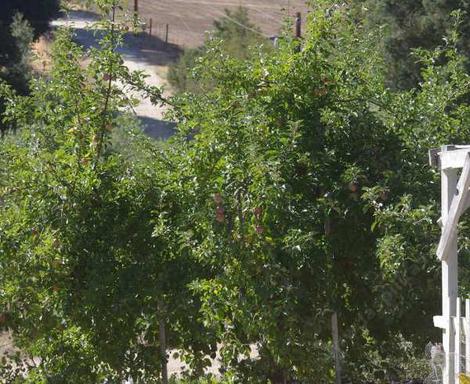
Our little apple orchard in the central coast ranges of California.
Ashmead('s) Kernel
Ashmead('s) Kernel, an old English variety of apple from the 1700's, is an anomaly here. The small tree bears very well every other year, the smallish fruit is tasty, and the fruit does not usually drop before ripening. The fruit has a rich flavor; sweet, not tart. The fruit is more on the soft side than the hard side. The fruit is russeted, but this does not detract from the flavor. Also, the raccoons do not seem to prefer it. The only problem is that the fruit cracks at the stem end. One of the causes researchers believe may be the daily temperature changes; heat waves, cold waves, which cause the fruit to expand unevenly. Since the tree is small, row covers placed over it prevent most of the cracking of the fruit. Also, more compost, and mulch added, to increase nutrition, would increase leaf area and numbers, so shading the fruit, moderating the temperature, to help reduce cracking. If it is partly a nutrient deficiency (some sources say Calcium), then adding compost will also help. The tree grows well here, but needs extra nutrition and would benefit from a companion plant placed on the western side of the apple tree. Current companions north and east of the tree are alder (Alnus incana ssp. tenuifolia), and coyote brush (Baccharis pilularis "Tranquility"). The alder is known to help with the nutrition of adjacent plants, as it fixes nitrogen from the air, via symbiotic bacteria, and so adds to the fertility of the soil.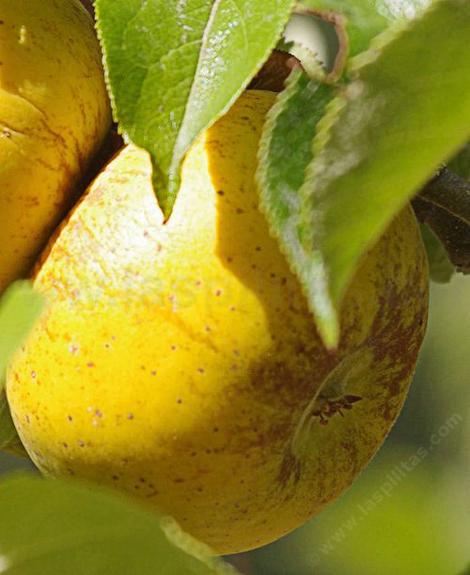
Ashmead('s) Kernel is a very old apple variety from England.
Bert Apple
This apple we call the Bert apple, is a variety unknown to us. It was purchased by a customer in 1972 or 1973, and we acquired it in 1979. The customer did not want this tree, as it had apparently died; it was rescued by Bert Wilson, who was doing landscaping work for the client at the time. So we named it the "Bert" apple, after its rescuer! This is either a seedling rootstock, the topstock of which died, or it is a named variety. This apple has been the top-yielding apple here for 35 years. The Bert apple usually ripens at the end of August, but most years hangs on the tree longer than other varieties, so has a longer harvesting period. It does not store very well, and is very good for cooking, but not that exceptional for eating, unless you love tart apples. A good, reliable cooking (and tart eating apple) apple for this area. Thank you, Bert!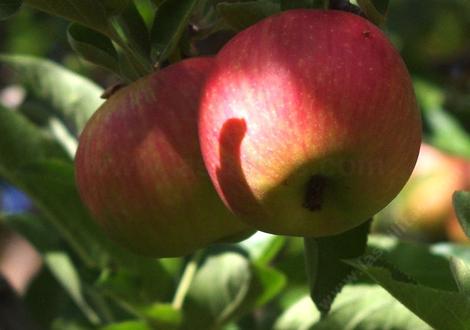
This is a tart cooking apple we call the Bert apple, which makes very good apple pies and applesauce.
Black Twig
This Black Twig variety of apple we had high hopes for, but after many years have decided that even though the tree grows well, the fruit has the flavor of tree-bark. Also, most of the apples fall off the tree before ripening. The fruit may do better with more nutrition and water, but water is very limited here. The raccoons enjoy the fruit, though.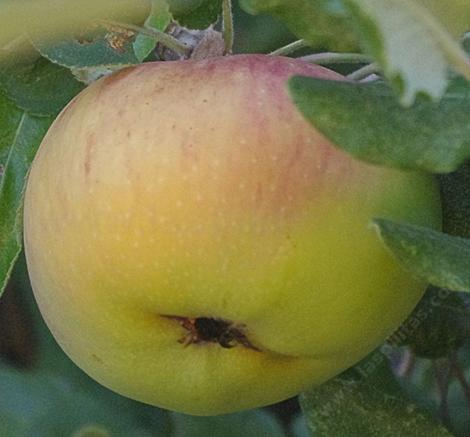
The Black Twig apple variety was originally found in Tennessee.
Calville Blanc D'Hiver
Calville Blanc D'Hiver is another apple variety that has grown surprisingly well here. This French variety has beautiful fruit, is good for baking, and the tree grows well. The taste is rich, sweet-tart, and excellent in pies, and the fruit holds its shape for tarte tatin. For several years after we acquired this variety, no fruit was formed, but the tree grew well and appeared healthy. The branches of the tree were very upright, so I took some string, and tied it onto each of the branches that I could pull down, near the tips, about 6 inches or so back, behind a few side branches to keep it slipping off, and then tied the other end of the string to any object as low to the ground as possible. This pulled the whole branch more into a horizontal position, and so the tree started forming fruits next year, and has been forming fruits every year since. If I remember, plant hormone levels partly explain this phenomenon, but researchers actually do not know the mechanisms behind whether the tree forms vegetative or flowering buds. This tree needs more nutrition, and the fruit drops somewhat before ripening, so the yield is not super high. Excellent companion plant, placed on the west side of the apple tree, is bigleaf maple, Acer macrophyllum. Other companion plants are hops (Humulus lupulus), coyote brush (Baccharis pilularis Pigeon Point), and grape (Canadice Seedless).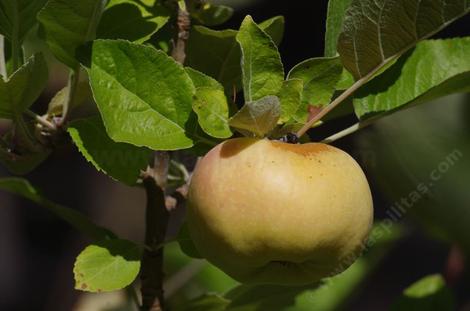
Calville Blanc D'Hiver is a French variety of apple from the 1500's and is very popular as a cooking apple there.
Cox's Orange Pippin
This English variety, called Cox's Orange Pippin, is an apple that has produced hardly any fruit, the fruit is very small, and the flavor of the apples here is very poor (tastes more like the bark of an apple tree). The fruit does not seem to drop prematurely, and the tree is growing well. The tree may need more nutrition and water, but I suspect part of the problem is that the climate is not to its liking. The tree is between 20 to 25 years old. In the last five years, the climate here has changed, in that the summers are much cooler. During this period, the tree bore more fruit, and the fruit tasted better than in years past, but still just below average. Also, to cook with it would be difficult, as the fruit is so small and the yield is so low. More water and more nutrition should increase the size and yield of the fruit, and if the summers continue to cool, the fruit may improve in flavor.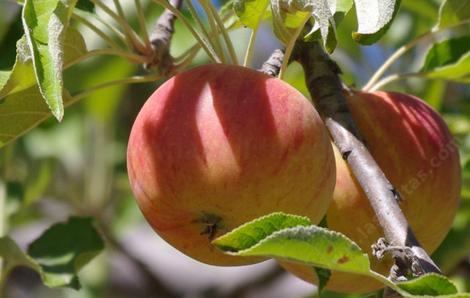
Cox's Orange Pippin originated in England in the early 1800's, and is highly regarded there.
Fuji
The Fuji apple is very tasty in this climate, and bears biannually with a good crop. These fruits have no noticeable tartness, just pure sweetness. They would not be very good for pies, no richness, or complex sweet-tart taste, but are great for fresh eating. Also, they store very well in the fruit drawer of the refrigerator. The apples do not drop much before ripening, but the raccoons enjoy the fruit also, unfortunately. A good companion plant to place on the west side of the apple tree is coffeeberry, Rhamnus californica. In fall of the year 2010, when the apples were supposed to be ripe, they weren't! The apples were 2 months almost late in ripening. In fact, one could hardly tell when they were ripe, as they did not slightly soften as they do when they become fullly ripe and fully sweet. So I bought some tincture of iodine at the drug store, and sliced off a piece of apple, and dropped one drop of iodine onto the cut piece of apple. If the iodine stayed the same color as when it first dropped upon the fruit piece, the apple was actually ripe. If the iodine turned color, dark bluish sort of, after a short time, about a minute or so, the apple was not ripe; that is, the starches in the apple had not turned to sugar. Iodine detects the presence of starch, and was used by English apple growers many years ago, to detect ripeness in their apples, and therefore, harvesting times. NOTE: Iodine is deadly poisonous, and is Fatal if swallowed. If you try this test, do not eat the cut piece of apple with iodine on it, please throw it away. To repeat, Iodine is deadly poisonous, and is irritating to nose, eyes, respiratory tract, so do not breathe the vapours, and wear glasses/goggles. I try this test out-of-doors.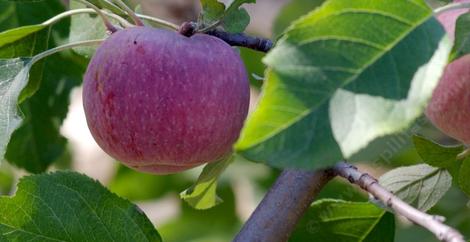
The Fuji apple is very sweet and is the most popular apple variety in Japan and China, being developed in Japan in the late 1930's.
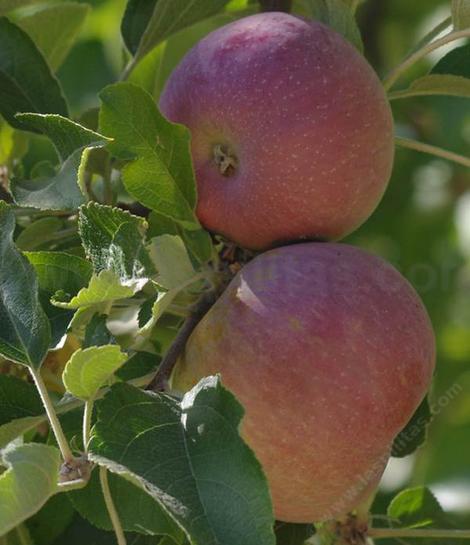
The Red Fuji apple in this photo is one of many red mutations of the original Fuji apple.
Fuji, Red
This Red Fuji apple is, we believe, one of many red mutations of the original Fuji apple and ripens in October-November usually. This variety is excellent here with flavor so good the crop goes quickly. These are actually better than the original Fuji, as they have more complexity to their sweetness here, and I believe the weather is partly responsible. The daytime heat helps to develop this wonderful flavor, as they do not have the same flavor in the cooler daytime summer temperatures of the coastal areas. The apples do not drop before ripening and the tree is dark green and grows very well. The apples are a good size and the yield is enough for everyone for a couple of months, and enough to fill the vegetable/fruit drawers of a refrigerator, and to eat for long after they have been picked from the tree. Coyotes and foxes love the fruit, also, but share, and are usually content with the fallen apples. Good companion plants for this variety are an annual clover, that emerges every wet year, is trimmed, when still green and just when the flowers start to form, and the trimmings are either composted, and put back under the tree as compost, or just placed on the ground under the tree.Gala
Early and flavorful describes the Gala apple variety here in the central coast ranges of California. The tree grows well, the fruit tastes very good, and the raccoons take a good share. The fruit is crisp and sweet, excellent for eating, but not so good for cooking. The fruit does not usually drop before ripening. Good nutrition and adequate irrigation, will increase yield and the size of the fruit.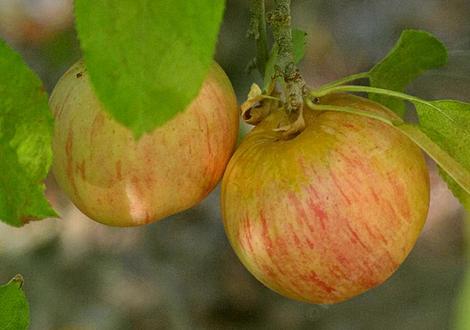
The Gala apple variety was developed in 1934 in New Zealand.
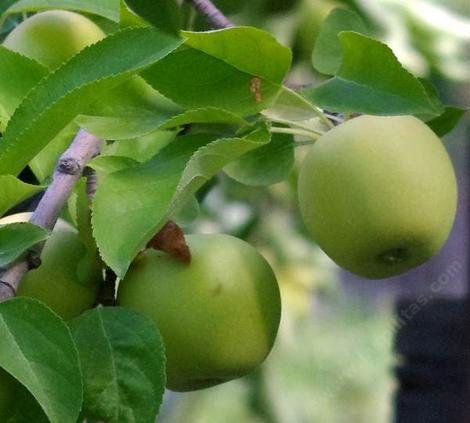
The Golden Delicious apple is originally from West Virginia.
Golden Delicious
This tree of the Golden Delicious variety bears a great yield every other year. The tree is on seedling rootstock we were told, but the tree is so small,12 feet high, that it may be on M-111 rootstock, or MM106, as many of the apples sold in retail nurseries in California are grafted on these rootstocks. The tree grows well, but the fruit flavor has been mediocre, by our standards. However, some people thatlike soft, creamy, sweet apples thought they were fine. In the last five years or so, the summers have been much cooler during the day, and the flavor of this variety has improved, and is very good. This variety, because of the improved flavor and texture, good for cooking and for eating fresh, and the high yield of the crop, is definitely a keeper. A good companion plant is a climbing or bush rose allowed to grow tall, and placed on the western side of the tree, but not too close to grab you with its thorns when you are picking the fruit. Also, keep the nutrition up to keep up the yield, health of the tree, and fruit size (compost placed under the tree to the drip line every year, and keep a bare circle of ground without mulch, from the trunk out a foot or so. One study many years ago, found that trees grown for 2 decades, were larger, healthier, and produced more fruit, when mulched every year with trimmings and/or compost and/or aged manure, than trees grown in soil that was cultivated and cropped, even with a cover crop. The key to this tree improvement program over time was to abstain from tilling and to add mulch every year.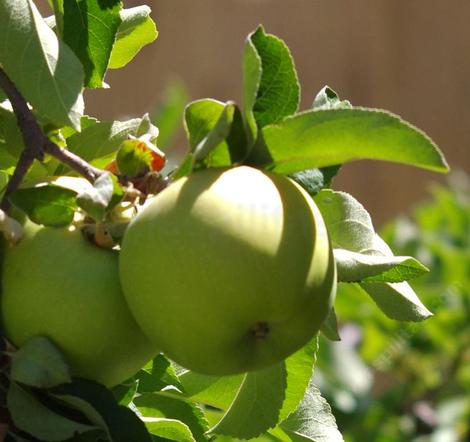
Granny Smith apples possess a naturally greenish skin when ripe.
Granny Smith
The Granny Smith apple variety is a Thanksgiving apple here, in that the fruits will usually hang on and ripen on the tree into November long enough that you can pick enough apples for a Thanksgiving apple pie. By this time, the apples have turned a yellowish-green, and are a wonderful tart flavor, with undertones of sweetness. They make a wonderful apple pie, apple crisp, apple crumble, and apple tart, using much less sugar, even no sugar, in the recipe. The warm/hot days have helped to fully develop the sugars to their maximum sweetness, and the apples are dripping sweet by early December. The tree grows well, and produces a good yield in this climate, but needs good nutrition and regular irrigation. Also, for many years, we harvested the apples in November, a great crop every other year, and stored them at room temperature, in single layers in slatted containers for air flow, in the coolest room in the house (northeast). A good companion is Salix lasiolepis, again placed on the western side of the apple tree. By the way, the apples purchased in the grocery store, are so green they have not developed that wonderful tart flavor, and color is an even medium green, instead of a mottled, yellowish-green.Gravenstein
The Gravenstein apple tree grows well here, but the fruit is often very poorly flavored, with mealy texture, and though the flavor has improved with the cooler summers in the last five years, many of the apples drop before they become ripe .We are able to make one pie out of a full-sized tree! The rest of the apples are green when they drop. In a more coastal climate, the apples may properly develop their distinctive excellent flavor. Cooking does not improve the flavor, and this apple is known more for its cooking qualities.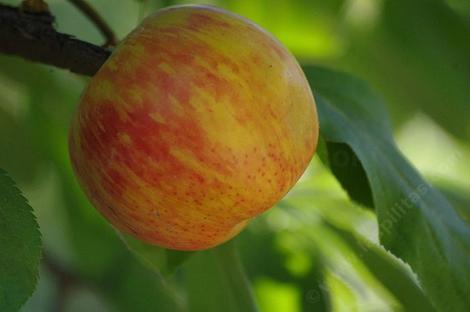
The Gravenstein apple may be of European origin, in the late 1600's, and brought over to America by European settlers.
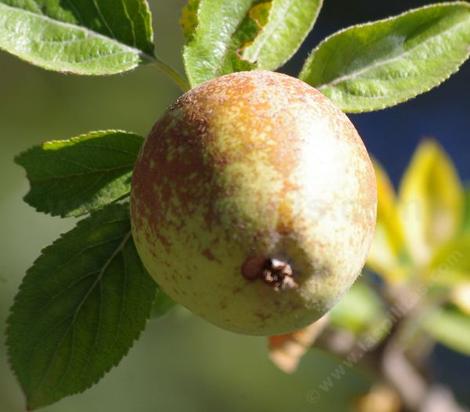
Hudson's Golden Gem is a highly russeted apple, which originated in Oregon in the late 1920's.
Hudson's Golden Gem
This apple variety, the Hudson's Golden Gem, has grown and produced well in this area of California. The tree bears well every other year, and the apples do not drop before they are ripe, though the yield is never real high. The tree has a very open structure, but the apple fruits do not sunburn, maybe protected by the heavy russeted skin. The fruit has very sweet, good, pear-like flavor, just as advertised. This tree needs good nutrition and adequate water, and would benefit from a companion plant, such as alder. This variety is very good in a fruit salad, skin and all (Most nutrients are just under the skin).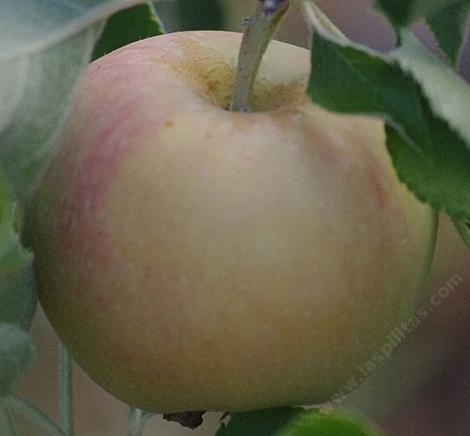
Jonagold apple was developed in New York state, and is a cross of the Jonathan and Golden Delicious apple varieties.
Jonagold
The Jonagold apple usually has wonderful flavor most years, but in very hot summers, the flavor is not excellent. The large fruit has a sweet-tart flavor that is good for baking and excellent for eating most years. The tree has grown well over many years and is very productive. This tree was purchased on seedling rootstock, and it was discovered that the roots were infested with the woolly apple aphid. Seedling rootstocks are susceptible to woolly apple aphid, and the trees are full-size, while people's gardens are becoming smaller all the time, so these full-sized rootstocks aren't used much anymore. So this tree was removed, and a Jonagold tree was planted on M-111 rootstock, which is reputed to be resistant to the woolly apple aphid. This variety needs good nutrition and regular irrigation to be productive. In the past, the domestic apple's ancestors naturally grew on chernozem soils, which are very rich in nutrients, and organic matter, and that is why regular mulching every year is very good for the health of apple trees, as this increases nutrients and organic matter in the soil.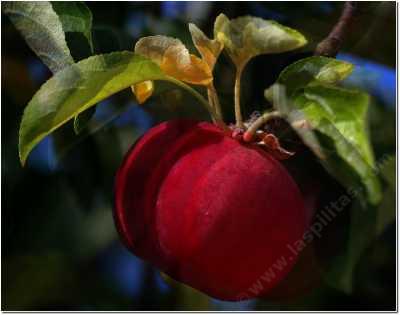
The Jonathan apple is very sweet-tart, medium-sized, and just right for a snack.
Jonathan
This apple is an old American variety, very popular, and a commercial type many years ago. The fruit is small here, and the tree is not very productive. In spite of being planted in sandy soil, and somewhat neglected, it produces a small crop of very tasty fruit every other year. The fruit has sweet, white flesh, firm but not hard, and is excellent fresh off the tree. This we call the snack apple, as it is just the right size for a snack for a child, if children ate apples as snacks anymore.This variety needs richer soil, and regular irrigation. Compost every year and cold manure as mulch under the tree would benefit it enormously. Alder as a companion plant would also aid the health of the tree. We are testing two species here, Alnus rhombifolia and Alnus incana ssp. tenuifolia. The variety does well here, and I would recommend it for this area, on more clay-type soils.Liberty
The Liberty apple was developed in the northeastern United States. Since that area has many apple diseases due to the high rainfall and high humidity, you can see the tree was bred to possess a very open structure.This tree structure is a liability here in the central coast ranges of California, where the humidity and rainfall are much lower. Also, here the elevation is 1500-2000 feet, and the sun is very intense, with sunburn of fruit and young trees common. This variety needs much more nutrition, and would benefit from a companion shrub/small tree to shield it from the intense afternoon sunlight on the western side. A good companion plant would be peach, cherry, or pear, or plum, probably the best being plum. Companion plants on the eastern side of the tree are California Lilac (Ceanothus thyrsiflorus repens), Oregon Grape (Berberis pinnata), and peach. The fruit produces a fair crop every other year, the fruit is small and with excellent taste. The fruit has white flesh similar to Jonathan, excelletn sweet-tart, spicy flavor, stores well in the refrigerator, but is not that great of a cooking apple. With more nutrition, and more water, the crop would be increased significantly, and the fruit size would be larger. Great variety.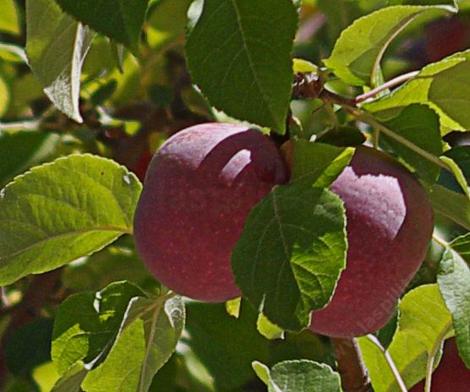
The Liberty apple was developed by Cornell University, in Geneva, New York.
Malus fusca
Malus fusca is a native crabapple that grows from northern California into Alaska. This species provided fruit for the indigenous peoples of the northwest. The tree is small here, and has not fruited yet, as it is only a couple of years old. The trees are growing well and should put on more growth, with the addition of mulch, companion plants of alder (Alnus incana ssp. tenuifolia) and an irrigation rate of at least 45 inches per year, as it grows mostly in wet spots. In Strybing Arboretum a tree is growing fine and bearing fruit, in part shade with regular water.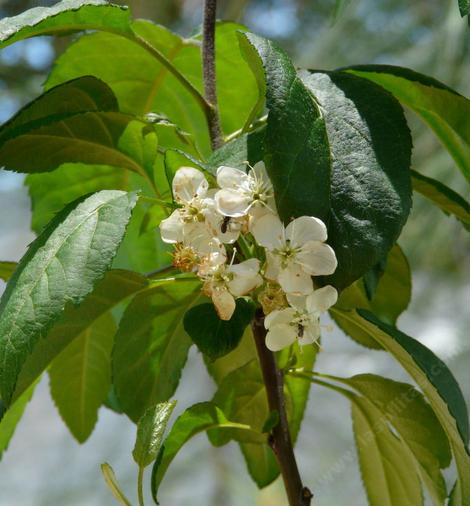
Malus fusca is a crabapple indigenous to northern California and north into Oregon, Washington, British Columbia, and Alaska.
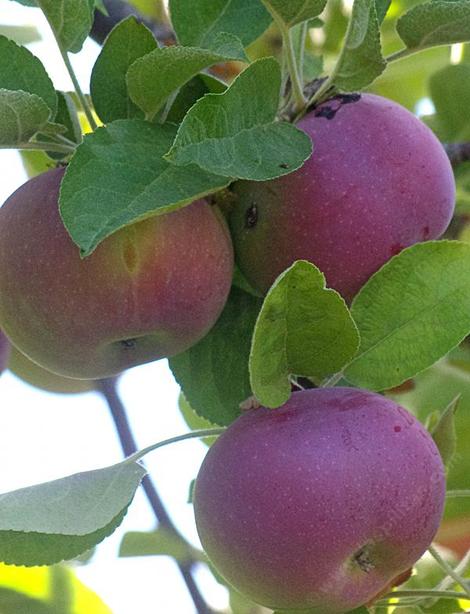
The McIntosh apple originated as a seedling on the McIntosh farm in Canada in the early 1800's.
McIntosh
The tree of the McIntosh apple variety grows very well here, but a portion of the fruit drops to the ground before ripening. Because the yield is so high, even though a portion of the crop drops to the ground, the net yield is actually good. What is so disheartening is that the tree produces a very high yield almost every year. The flavor of the apples is poor. The fruits taste like the bitter skin of a Red Delicious apple, kind of bittersweet. To us, the apple does not taste good, but others who have tasted it seem to like it. We gave some fruit to a friend and he raved about their great flavor, so maybe it is just a difference in taste. Well, people even eat quinces (Cydonia oblonga) raw here, so there really is no accounting for taste!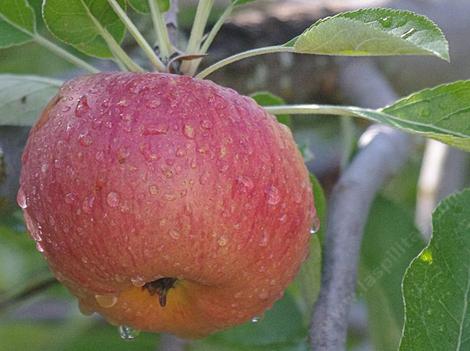
Melrose apples are solid and sweet. Just like I used to be.
Melrose
The Melrose apple tree grows well, is a small tree, and is a very attractive ornamental. The fruit tastes very good, but some of the fruit falls before ripening, so the actual yield is lower. The fruit is hard and sweet, similar to a Red Delicious, but firmer, with much better taste, texture, and the skin tastes good (unlike the bitter skin of the Red Delicious). The companion plants here are wild strawberries (Fragaria vesca), which grow extremely well with the Melrose apple tree, bearing much fruit. You can still apply a mulch of one inch of compost on top of the strawberries under the tree every year, and this will help the growth of the berries and the apple tree.Mollie's Delicious
Mollie's Delicious is the other top-yielding apple variety here, as it is early, drops hardly any fruit before ripening and bears heavily every other year. The leaves of the tree are dark green and the tree is large and vigorous here. This tree is on seedling rootstock and is 15 feet high. The fruit is large and wonderfully sweet, and is best for eating. Companion plants are peach, wild strawberry (Fragaria vesca), and raspberry. The fruit usually ripens in late August, and people, raccoons, foxes, and dogs (Harry Potter) love the fruit, so it goes quickly. This is a great early variety here in the California central coast ranges. The fruit does not store very well, though; hand to mouth only. A really great early apple variety here.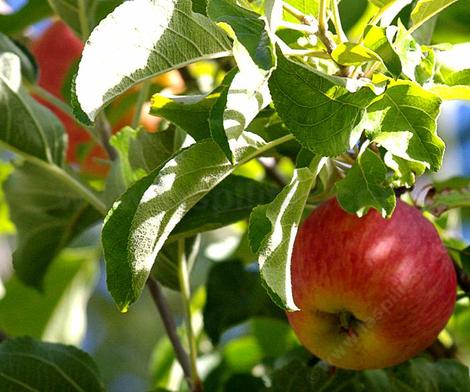
Mollie's Delicious apple is a large sweet variety bred at Rutgers University in the state of New Jersey.
Mutsu
The Mutsu apple is a very vigorous tree here, and the fruit is very large, and tastes wonderful. The fruit is excellent for eating and cooking. This is one of the most underrated apple varieties, as it is pretty much a fruit of many talents, and very large, so you can make pies and tarts much faster if you are in a hurry (as most of us are always short of time). The fruit is greenish-yellow when ripe, more on the yellowish side than Granny Smith. I have heard some compare it to Granny Smith, but this is definitely superior to Granny Smith, with much more complex sweet-tart flavor, excellent for eating and cooking. Granny Smith apples are very tart, and though very good for cooking, not that great for eating fresh, and the flavor is more watery, without the complexity of Mutsu. The fruit does not drop before ripening, and ripens around October usually. The problem is the raccoons love this fruit. If you don't have raccoons, you will probably get a good yield of fruit, if you take good care of your tree; water it regularly, and apply mulch every year under the tree (the mulch is placed on top of the ground not incorporated into the soil). If you have other varieties of apples nearby, you should get a good yield of fruit. If there are no other apple trees nearby, buy a different variety of apple ( Golden Delicious usually works well, but ask your local nursery), to plant near your Mutsu tree. It needs the pollen of another apple variety (carried by a bee) to set fruit.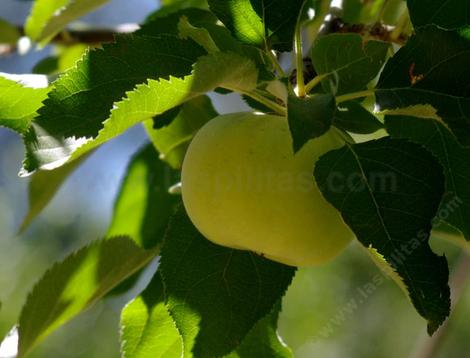
The Mutsu apple was bred in Japan.
Newtown Pippin
The Newtown Pippin apple variety has done fairly well here, and the very firm, almost hard fruit has a rich, sweet-tart, unusual flavor, probably better for all cooking uses than for fresh eating for most people, if you compare it to Fuji. Most people can barely pull themselves away from the utter sweetness of Fuji, but this Newtown Pippin variety has more to recommend it than Fuji, being a multipurpose fruit; very good for eating, and excellent for cooking. Here the fruit drops somewhat before it is ripe, so that lowers the yield. The taste is great though, if you are able to eat some fully ripened fruit (the raccoons agree!). The variety needs higher nutrition here, and regular water. The tree grows well, and has wonderful weeping branches. Good companion plants are roses (dont plant too near, or they wil snag you when harvesting, and it will be a painful experience), alders (Alnus incana ssp. tenuifolia), honeysuckle (Lonicera subspicata), and plum (Elephant Heart variety).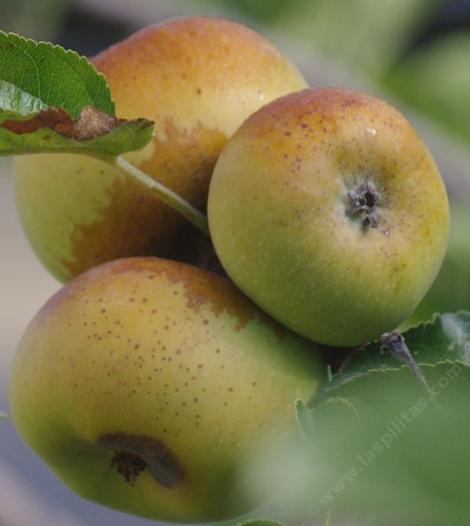
Newtown Pippin apple is considered by many to be the best apple in the United States.
Pink Lady
The Pink Lady variety is dry farmed here. The fruit is small, two inches to three inches wide, but very flavorful and tart. The rootstock is M-111, the soil is heavyish clay, and the rainfall averages around 20 inches per year. Companion plants are California Lilac (Ceanothus Frosty Blue), California Buckwheat (Eriogonum fasciculatum), Cleveland Sage (Salvia clevelandii "Alpine"). The yield is fairly low. This experiment demonstrates how drought tolerant, plants really are; arent they amazing? This plant has survived many drought years, and on good rainfall years, the yield is good and the fruit is larger. Although the fruit may be very small on dry years, no, it is not a crab apple. This Pink Lady apple, with the way it is farmed here, produces a wonderful burst of intense, tart-sweet flavor when chopped into a fresh fruit, or vegetable salad, or sliced and added into a sandwich.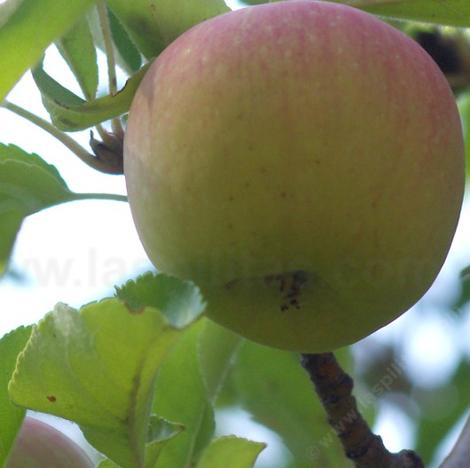
Pink Lady apple has pink skin, and was developed in Australia.
Pink Pearl
The Pink Pearl apple tree has grown very well here and we always get most of the fruit, but some percentage of the fruit drops before ripening. The fruit is very good, tart, and good for cooking, and especially makes beautiful, tasty pink applesauce The tree produces well every other year, and is attractive. Even though the tree is in clay soil that is on the heavy side, is overwatered by a valve with a small leak, and the sprinkler section drains into the lowest sprinkler there, the tree grows well, and the yield and flavor of the fruit is very good. Companion plants are alder (Alnus incana ssp. tenuifolia), gooseberry (Ribes divaricatum), and coffeeberry (Rhamnus californica "San Bruno").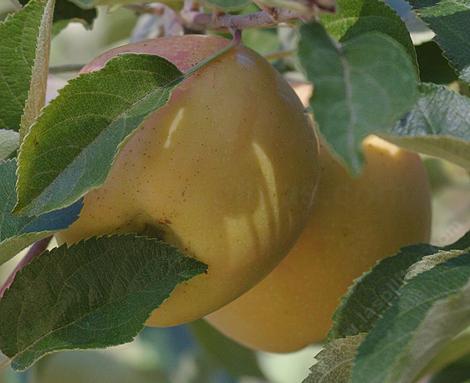
Pink Pearl is a very popular variety of apple due to its pink flesh, and good, tart flavor.
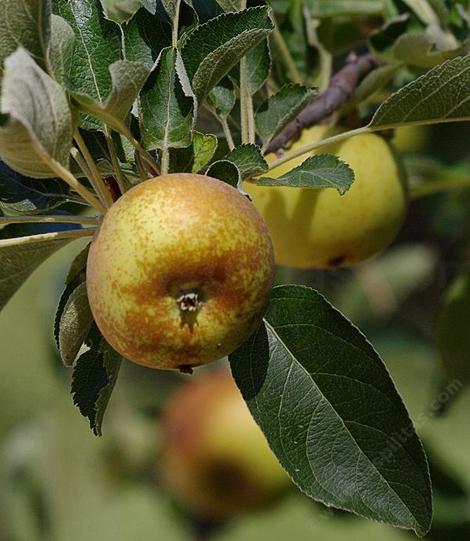
Roxbury Russet is a very old apple variety from Roxbury, Massachusetts.
Roxbury Russet
The Roxbury Russet apple tree grows very well here, with dark green leaves, and a nice form. The tree bears good yields, but depending on the year, a certain percentage drops before ripening. This fruit has one major use, and is excellent for sweet apple cider. The flavor of the cider is much, much superior when it is made with an apple press as compared to an electric juicer. The tree requires adequate water, regularly applied, to produce juicy fruit and lots of yummy apple cider.Sierra Beauty
Sierra Beauty, one of our very own California varieties of apple, has grown well here. The firm, white-fleshed, tart fruit is excellent for baking and the crop is good every other year (biennial bearing). Companion plants are peach, elderberry (Sambucus mexicana), and, Creeping Sage (Salvia sonomensis). Sierra Beauty apple needs an annual feeding of compost/mulch in this area. We use goat manure compost mixed with chicken manure compost, which works very well. Getting a soil test would help over the long term to see if you were adding enough nutrients to keep the tree healthy. Here the tree does not have enough leaves and they are not large enough to shade the fruit somewhat from sunburn. This could be remedied with more nutrients applied to the tree. Apple trees do need extra care, though not a lot, just a little, and your reward is lots of apples, yum!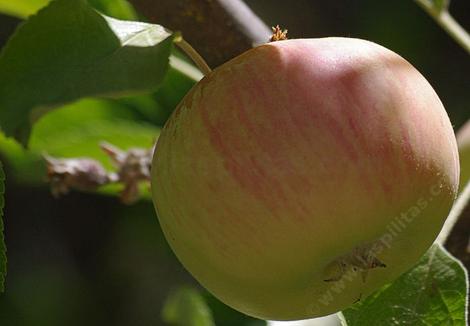
Sierra Beauty apple actually originated in California.
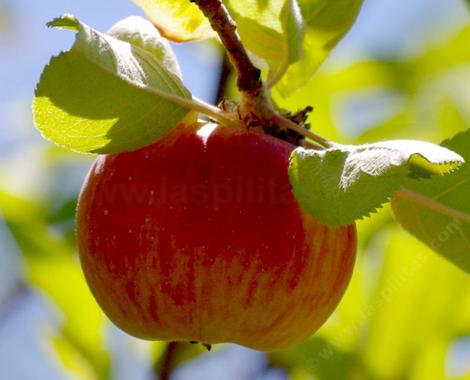
The Spigold apple was developed in New York in the 1950's.
Spigold
After a good number of years, Spigold finally produced a small crop of apples this year. As you can see, this tree is very slow to come into bearing. Because of the weather this year, they did not ripen before most fell off the tree. The fruits that we did eat, were a tasty, light, tart-sweet. Not sure if this variety will work out here, as it is a cross between a northern and southern variety of apple, but thought we would give it a try. The flavor is real good; just not sure if there will be enough of a crop to make it worthwhile to grow. Will wait a few more years and see. The tree is very pretty.Esopus Spitzenberg
The Spitzenberg variety has grown very well here for many years, with a good to excellent crop of very good-tasting apples every other year. The apples are not soft but hard and dense. These apples have a unique rich sweetness. They are not really tart enough to be good for cooking; are excellent fresh, and store well. Ripening time is October through November, though this year, 2010, they ripened much later, into December. Companion plants are grape (Black Monukka Seedless), thimbleberry (Rubus parviflorus), Oregon Grape (Berberis pinnata), peach, and California Lilac (Ceanothus thyrsiflorus repens). These apples are supposed to be highly susceptible to fire blight in humid, high rainfall areas, but have never been infected in this dry climate, in 21 years.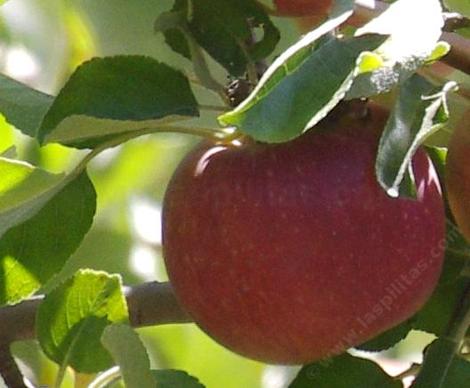
Esopus Spitzenberg apples are red and solid; not an apple to eat with loose dentures.
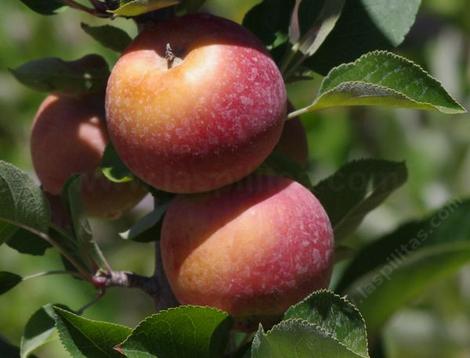
The Splendour apple originated in New Zealand.
Splendour
The Splendour apple variety is a very attractive small tree here, and the fruit is very sweet and good, but much of the fruit drops before ripening and is very susceptible to sunscald. More nutrition and more companion plantings may remedy this problem. The branches are more horizontal and painting the tops of these branches with a solution of 1/2 water and 1/2 white latex paint, has helped to prevent sunburn of the branches, (reflects the light back off of the tree) but this water/paint solution needs to be added every year. This fruit is better for eating than cooking. The fruit is on the small side; sweet, not tart. Companion plants are peach, apple, and wild strawberry (Fragaria vesca).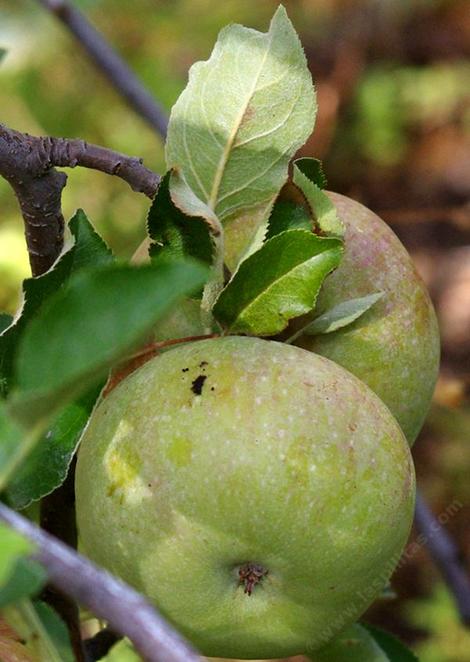
Tydeman's Late Orange is a very good dessert apple developed in England.
Tydeman's Late Orange
This Tydeman's Late Orange apple tree, more than any other variety, has been a big surprise here in the dry, hot summers of California. This tree was developed in the cool, wet summers of England and has the poor performer (in this area) Cox's Orange Pippin in its ancestry. Anyway, the tree has been growing here for a while now, and never bearing any fruits or just one or 2 fruits. This year it bore 10-20 fruits, and they were absolutely large and beautiful. Unfortunately, very hot spells alternating with cool spells, occurred late this summer of 2010, and most all of the fruit fell off before ripening (the raccoons had a hand in this, I am pretty sure!). Anyway, now it is on its way to production, and we will see how it fairs next year. The soil in which this Tydeman's Late Orange is growing is almost pure sand, very poor, and we are always watering religiously to keep it hydrated. The small ornamental tree seems healthy, with dark green, glossy, leaves and pretty arching branches. I don't think we will give up on it yet. If the summers keep cooling, it may think it is back in England and the fruit will stay on the tree until it ripens and we may get to finally taste the excellent fruit everyone is raving about. Companion plants are Penelope rose, Bert apple, California fragrant rose (Rosa woodsii var. ultramontana), snowberry (Symphoricarpos albus), and alder (Alnus incana ssp. tenuifolia).Wickson
This little tree, has only been planted a few years, but started bearing very young, and has been producing very good, pretty, small fruit ever since. This Wickson apple is actually a crabapple ( Crabapples are usually different species of wild apples with very small fruit). The fruit tastes very sweet and good; it is just diminutive, and its size is part of its charm. The fruits can be used whole for many dishes, during the holidays. The crop is not large enough to have extra apples for cooking yet, as all the fruit is quickly eaten fresh. This is a versatile fruit, though small, and the tree is ornamental. Companion plants are Grape Soda Lupine (Lupinus excubitus), Coyote Brush (Baccharis pilularis), California Grape (Vitis californica), cherry, Hummingbird Sage (Salvia spathacea). The tree is growing well here, and tolerates the hot summers, and sometimes cold winters (nighttime lows of 12 degrees F) for this area of California. The Wickson is an apple variety that seems well adapted here, and produces yummy, very small apples.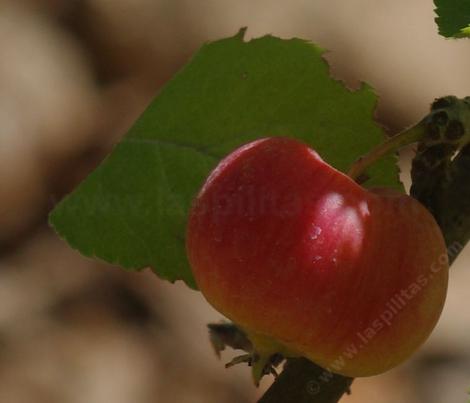
The Wickson apple was developed in California by the apple breeder Albert Etter during the Great Depression.
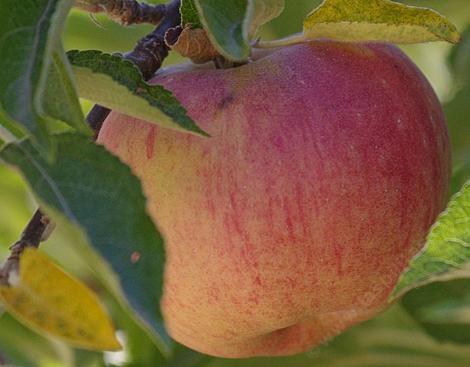
Stayman Winesap may be a seedling of the original Winesap apple.
Winesap, Stayman
The Stayman Winesap apple has been very disappointing here, as much of the fruit drops before ripening, and the fruit that does ripen, is taken by the raccoons, the minute they deem it perfect to their taste. So we have pretty much very low yield, on many years. The fruits are very pretty, though, and the tree is large, beautiful, and dark green. The fruit has white flesh, beautiful red coloring, is sweet-tart, firm, with excellent taste. At least we know they taste great when they do get ripe!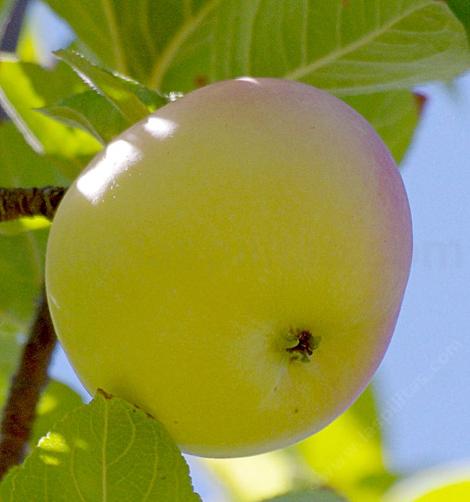
The Winter Banana apple is an old, unusually beautiful variety of apple, originating in Indiana in the late 1800's.


